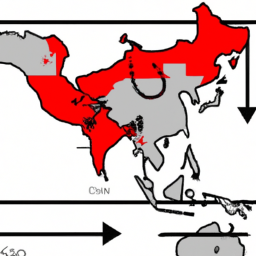On this day in 1953, President Dwight Eisenhower warned that the political and military situation in Asia had become "very ominous for the United States." In response, he coined the term "domino theory," a Cold War idea that would shape U.S. foreign policy for decades to come. The theory held that communism in one nation would spread communism into neighboring nations, like falling dominos. As a result, the United States saw itself as the protector of democracy and capitalism, and intervened in conflicts around the world to prevent the spread of communism.
Southeast Asia was a particular concern for Eisenhower and his administration. In the aftermath of World War II, colonial powers were retreating from the region, and communist movements were gaining strength. In 1950, the United States began providing military aid to the French in their attempt to regain control of Vietnam. However, the French were ultimately defeated at the Battle of Dien Bien Phu in 1954, and Vietnam was partitioned into North and South.
The United States saw the partition as a temporary measure, and sought to reunify the country under a democratic government. However, the communist government in the North, led by Ho Chi Minh, had other plans. In 1959, the Viet Cong, a communist guerrilla group, began a campaign of insurgency in the South. The United States responded by sending military advisors and equipment to support the South Vietnamese government.
The Vietnam War would become the defining conflict of the domino theory era. Despite massive U.S. military intervention, the South Vietnamese government was unable to defeat the Viet Cong. The war dragged on for over a decade, claiming the lives of over 58,000 U.S. servicemen and countless Vietnamese civilians. In 1975, the North Vietnamese captured Saigon, the capital of South Vietnam, and the country was reunified under communist rule.
The failure of the Vietnam War dealt a significant blow to the domino theory. It became clear that communism was not a monolithic force, and that nationalist movements in various countries had their own unique characteristics. Additionally, the United States' intervention in Vietnam was widely criticized as an unnecessary and unjustifiable war.
Despite this, the domino theory continued to influence U.S. foreign policy in the decades that followed. The United States intervened in conflicts in Central America, the Middle East, and elsewhere, often citing the need to prevent the spread of communism. In some cases, these interventions were successful in achieving their stated goals. In others, they were disastrous, leading to protracted conflicts and instability.
Today, the domino theory is largely discredited. The collapse of the Soviet Union and the end of the Cold War marked the end of an era in which communism was seen as a global threat. However, the legacy of the theory lives on in the United States' continued intervention in global conflicts. The country remains a superpower with a vested interest in maintaining stability and promoting democracy around the world.
